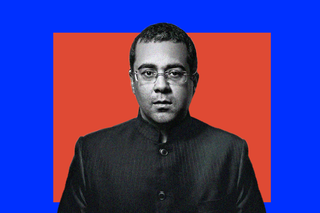
Chetan Bhagat’s Remarks Promote Rape Culture and Sexual Repression in the Same Breath
What’s more surprising than Bhagat’s remarks is the fact that he continues to be provided with platforms to channel his sexism.

Chetan Bhagat — author of Half Girlfriend, a misogynistic piece of literature from 2014 — is in the news again for perpetuating more sexism. “On one side, there is a youth who is protecting our nation at Kargil, and on another side, we have another youth who is seeing Urfi Javed’s photos hiding in their blankets,” the author stated at a literature festival recently. When called out on it, instead of apologizing for his statement, he doubled down on it, claiming “there’s nothing wrong” with his remarks.
Except, there is indeed a lot that’s wrong with his comments. For starters, as Javed responded, “Just because you’re a pervert doesn’t mean it’s the girl’s fault or what is she wearing. Unnecessarily dragging me into a conversation, commenting on how my clothes are distracting young boys is such as f****d thing to say.” In other words, Bhagat — much like many neighborhood uncles one has encountered — didn’t just deem it appropriate to comment on the attire of a woman who never sought his opinion. He also went on to blame said attire for distracting men who are — seemingly, as per Bhagat’s remarks — hardwired to be perverts.
His statements, then, as Javed rightfully pointed out, “promot[es] rape culture” by “blaming women’s clothes for the behavior of men.” To be fair, though, promotion of misogyny and rape culture isn’t new for Bhagat, who is not only notorious for mansplaining feminism to feminists, but is also known to have compared women to chocolate cakes and racing cars, implying that womenkind’s sole function is to provide sexual pleasure to men. “Why should any guy want to be only friends with a girl? It’s like agreeing to be near a chocolate cake and never eat it. It’s like sitting in a racing car but not driving it,” he had written in 2009’s Two States, which is, interestingly, an autobiographical account.
But what sets his latest remarks apart isn’t just the misogyny they reek of. In the same breath, Bhagat has also managed to promote sexual repression. By suggesting that people exist on a binary — either realizing their ambitions or masturbating under blankets — he paints the latter, an otherwise healthy sexual practice, in a negative light. Not to mention, of course, that the two extreme cases he referred to, aren’t even mutually exclusive.
What makes Bhagat’s remarks especially damaging is the fact that, in India, sex is already a taboo topic. And, growing up, when people are exposed to social conditioning that treats anything remotely sexual as “immoral” and “shameful,” it can result in sexual repression, past research has shown. Bhagat’s comments, then, add to a narrative that leads people to feel guilty and ashamed about even experiencing sexual desires.
Related on The Swaddle:
How Kapil Dev Dismissing Mental Illnesses as Fads Actively Harms People
It is precisely this attitude that has manifested as a society so ashamed of the very notion of sex that it not only deprives children of sex education, but also basic biology. Most of us have encountered teachers who rush through chapters on the reproductive system — if not skip them completely — simply because they deem even scientific deliberations on the human anatomy, obscene. As such, children grow up learning about sex through porn, and then grow up with a toxic — and, at times, even criminal — outlook towards sex. Evidently, then, it is remarks like those of Bhagat’s that arguably lead the youth far more astray than Javed’s social media content allegedly does.
Bhagat’s track record in his books, too, betrays a disconnect in his comprehension of gender dynamics. In 2016, Bhagat wrote a book, One Indian Girl, from the perspective of a woman, and genuinely believed he was doing a favor to women everywhere by tackling the “social issue” of feminism through his work. “Well, firstly, just a male author telling a story from a female point of view is, it’s kind of bringing attention…. Because a popular male author is doing it, I think that itself…. It tries to understand feminism,” he told Mint in an interview.
As for the book itself, it’s protagonist, a successful investment banker, says things like, “[N]o Punjabi male will like me, I don’t have breasts the size of footballs like other Punjabi women,” benefitting Bhagat’s understanding of feminism — whatever that is — in the process.
At the peak of his long-term career in misogyny, though, rest the #MeToo allegations against him. As such, what’s more surprising than Bhagat’s remarks is the fact that he continues to be provided with platforms to channel his sexism; that reflects more poorly on us than on him.
As writer Kahini Iyer had noted in a 2019 article, “Clearly, there’s a reason Bhagat, a guy who slipped out of a cheating scandal by calling his wife the Parvati to his Shiva, is still considered a youth icon on his 45th birthday. Is this a sign that the chief values of future generations will be opportunism and thinly veiled misogyny?”
Devrupa Rakshit is an Associate Editor at The Swaddle. She is a lawyer by education, a poet by accident, a painter by shaukh, and autistic by birth. You can find her on Instagram @devruparakshit.
Related


How the ‘Neutral’ Indian Accent Erases Our Histories
